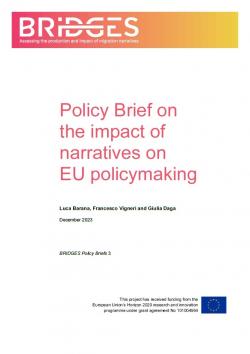Policy brief on the impact of narratives on EU policymaking

This policy brief looks at the implications of migration narratives for European policymaking. It focuses on the circulation of narratives in the national media and the EU political and policy debates in two key moments: the proposal for a relocation scheme to redistribute asylum seekers among EU Member States in 2015, and the activation of the Temporary Protection Directive for refugees fleeing Ukraine in 2022. After presenting the findings of a research report (D8.1) produced in the framework of the Horizon EU project BRIDGES, this policy brief focuses on translating these findings into policy implications for the EU. The ultimate aim is to draft recommendations for members and officials of European institutions that may contribute to shaping narratives for fairer, comprehensive, and balanced European policy responses to migration and asylum.
Due to the high stakes that migration and asylum entail, institutions, political forces, and the media promote their own narratives to advocate for their preferred policy outcome. Depending on the policy solution that they are pushing forward – usually in favour or against EU-wide actions -, these narratives may identify different causes, heroes, and victims. After taking stock of dominant narratives in both case studies – namely, the one denouncing the divisions among member states in dealing with the 2015 migration and refugee ‘crisis’ and another in favour of solidarity-measures towards refugees fleeing Ukraine in 2022 – the brief thus argues that policymakers in the EU should (i) de-politicize discourse(s) on asylum and migration; (ii) encourage positive narratives in the media; (iii) make full use of EU institutional factors to filter populist narratives when they move from the political sphere to the policy sphere; (iv) frame narratives promoting policy solutions on migration within broader (geo)political policy areas of great value for European societies.
-
Dati bibliografici
BRIDGES Policy Briefs, No. 3 (December 2023), 12 p. -
ISBN/ISSN/DOI:
10.5281/zenodo.10417224



